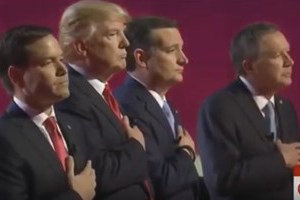A divide on policy toward Israel became evident between Donald Trump and his three remaining rivals during a March 10 Republican presidential debate in Miami.
Texas Sen. Ted Cruz, Ohio Gov. John Kasich and Florida Sen. Marco Rubio all argued the U.S. president should not remain neutral in the conflict between Israel and the Palestinian Authority but must stand with Israel. Trump said multiple times he is “pro-Israel” but argued the president should take a “somewhat neutral” posture toward the two groups “so we can maybe get a [peace] deal done” – a prospect Kasich and Rubio called impossible at present.
Israel and the Palestinians have been engaged in violent conflict since the founding of the modern state of Israel in 1948 over who should control the biblical Promised Land. Following the 1993 Oslo Accords, the Palestinian National Authority, also known as the Palestinian Authority, was established as a Palestinian self-governing body to control the Gaza Strip and areas of the West Bank. One member of today’s Palestinian Authority coalition is Hamas, an Islamic fundamentalist group designated by the U.S. State Department as a terrorist organization.
A seven-minute discussion on Israel arose when Cruz criticized Trump for failing to adopt strong enough policies toward America’s enemies despite his “incendiary” rhetoric. As one of three examples, Cruz referenced the GOP frontrunner’s stance on Israel.

Screen capture from YouTube. U.S. policy toward Israel was among the topics discussed at a March 10 Republican presidential debate in Miami. |
“On Israel, Donald has said he wants to be neutral between Israel and the Palestinians,” Cruz said. “As president, I will not be neutral. And let me say, this week a Texan, Taylor Force – he was an Eagle Scout, he was a West Point graduate, he was an Army veteran. He was murdered by a Palestinian terrorist this week in Israel. And I don’t think we need a commander-in-chief who is neutral between the Palestinian terrorists and one of our strongest allies in the world, the nation of Israel.”
Trump responded “there’s nobody on this stage that’s more pro-Israel than I am,” citing his “massive contributions to Israel” and status as “grand marshal not so long ago of the Israeli Day Parade down 5th Avenue” in New York. He spoke of his Jewish daughter and two Jewish grandchildren and pledged to make protecting Israel “an absolute priority” as president.
Yet Trump said “a peace settlement” likely will require some degree of American neutrality.
“I would like to at least have the other side think I’m somewhat neutral as to them,” Trump said of the Palestinian Authority, “so that we can maybe get a deal done.” He classified the prospect, however, as “probably the toughest negotiation of all time.”
Rubio said it is “undeniable” the Palestinian Authority incites violent attacks against Israel and argued Trump was – perhaps unwittingly – advocating an “anti-Israel policy.”
“Maybe that’s not your intent,” Rubio told Trump, “but here’s why it is an anti-Israel policy: There is no peace deal possible with the Palestinians at this moment … because there’s no one to negotiate with. The Palestinian Authority is not interested in a serious deal, and they are now in union with Hamas, an organization whose specific purpose is the destruction of the Jewish state.
“Every time that Israel has turned over territory of any kind, be it Gaza or now in Judea and Samaria, it is used as a launching pad to attack Israel,” Rubio said. “And that’s what will happen again. These groups are not interested in a deal with Israel. What they are interested in is ultimately removing the Jewish state and occupying its entire territory. So maybe in 30 years the conditions will exist” for a deal, “but they do not exist now.”
A president who forced Israel to the negotiating table, Rubio said, would embolden the Jewish state’s enemies.
Kasich appeared to go a step further than Rubio, saying there is no “long-term, permanent peace solution.”
“I think pursuing that is the wrong thing to do,” Kasich said. The “way to proceed in the Middle East” is to pursue “stability in that region by supporting the Israelis and making sure they have the weapons and the security that they need with our 100 percent backing.”
Kasich noted Hamas is attempting to attack Israel “from above” with missiles and from “under the ground” through tunnels.
At one point, Cruz appeared to accuse Trump of “moral relativism” and compared his stance with that of President Barack Obama and Democratic presidential frontrunner Hillary Clinton.
“The reason we are friends and allies with Israel is they are a liberal democratic country that shares our values,” Cruz said. “They’re our strongest ally in the region.”
However, he continued, the Palestinian Authority “that Donald, along with Hillary Clinton and Barack Obama, say they want to treat neutrally … is in a unity government with Hamas, a terrorist organization. They pay the families of these terrorists who murder people. And this is exactly the moral relativism Barack Obama has.”
Part of an effective strategy to combat Hamas, Cruz said, is partnering with Egyptian President Abdel Fattah el-Sisi in his efforts to stop Islamic terrorists.
Throughout the discussion, Trump appeared to hold out hope for a negotiated peace.
Trump said some of his friends who “happen to be Jewish and love Israel … know it’s tough, but every single one of them wants to see if we would ever have peace in Israel. And some believe it’s possible. It may not be, in which case we’ll find out. But it would be a priority if I become president to see what I could do.”
(EDITOR’S NOTE – David Roach is chief national correspondent for Baptist Press, the Southern Baptist Convention’s news service.)
